Mass shooters are hard to write about.
So, I wrote about the cultural forces that lead to them and realized we've all got blood on our hands. Go figure.
When I hear about these mass shooters, I have a lot to say, and I’ve tried several times to say it. But as I do, I know it’s not formed enough for anybody to hear. And it’s not ready. And I know it’s hopeless to try and communicate. It’s pointless, because everything you say can and will be subsumed into the system of interpretation. We lack the ability to divorce the event from the event’s presentation and interpretation.
It turns out, considering how to discuss mass shooter motivations, just like any other contentious topic, follows the same logic that tends to plague the mass shooters themselves—at least as they’ve evolved through the digital age, with the benefit of observing and learning from previous shooters (Columbine being generally accepted as the key catalytic event in this department).
Note: I apologize in advance for the harsh, flippant, or snarky tone. This is a tough subject for me. I’ve tried to write about it in various styles, this style got me to push through it.
Note-Note: The children killed in Minneapolis is something I’m really troubled by, especially after reading the statements by the parents. I’ve chosen to focus on what I think characterizes the shooter phenomenon here in hopes that we could lessen its likelihood. I’m not going to do my grieving for the kids here, but that doesn’t mean I’m more concerned with the lives of shooters than victims, nor should you be.
The Doug Wilson Example
Here’s an example that’s come up recently. Somebody will make an argument—let’s say Doug Wilson, “Hey, you know, slavery was no good, but it’s been over-presented in our culture. And there were several cases where… whatever, whatever.”
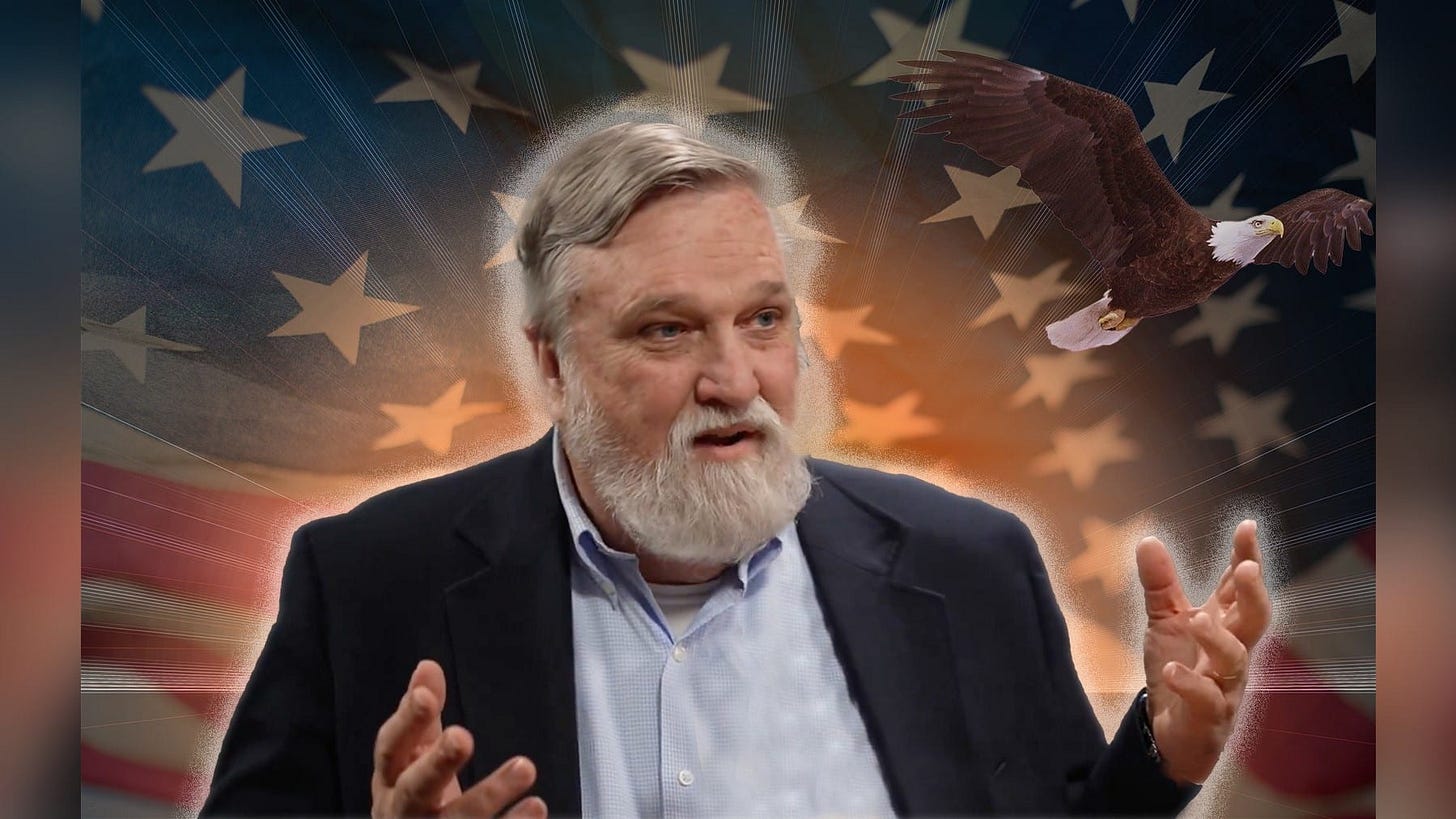
His argument may have been nuanced, it may have carefully considered the opposing viewpoint—I don’t know, I didn’t read his book on it. The book’s contents don’t matter, nobody even asks what’s in the book. You can read multiple articles just discussing the summary of the book, the title of the book, and then holding it up and saying, “Look at the stuff he talks about!”
Which is true: it is a thing he talked about, but this presentation is both a manipulation of and reliant upon your interpretive power. They understand that you’re very negative, and you’re keen on interpreting things in an extraordinarily uncharitable way. What they expect you to do is be satisfied with the summary, and by virtue of the fact that Wilson even wants to make that argument, you know he’s doing it in reaction to something, and you know that if you’re reacting to the idea that slavery was bad with some sort of opposing view, it doesn’t matter how you’re opposed. See, “how” and “how much” are just too icky and complex; we’re content to know that you’re opposed.
So, it wouldn’t matter how careful he was in the book, nobody’s got to address the content of the book. Heck, maybe the title and summary were a bait-and-switch and he’s actually fully in-step with everyone else! We may never know.
I’ve made this case already with the Doug Wilson thing, only to find out a gentleman who I didn’t know, and never spoke to. I was DM’ed, found out he had screenshotted what I’d said, and used it to accuse somebody else who had merely liked my post of racism. I had said nothing racist, I’d said, “hey nobody seems to be telling me the content of the book in these articles.”
Point is, unbeknownst to me, some stranger takes me as a type and he holds me up for reaction in a way that’s aligned with Doug Wilson, who we’ve already inferred a whole mythos about. Is this making sense? He reacted to my reaction—he spectacled my reaction, which was spectaclizing/reacting to another article (which is pathetic of me), which was reacting to/spectaclizing to Doug Wilson reacting to the culture’s reaction to slavery.
And in none of these did we actually discover what the heck Doug Wilson actually said. We’re multiple layers removed from what his argument actually was, and who knows how many away from the historical truth of it. We’re engaging his mythological representation. Then we decide to react to that, and how we decide to react to other people reacting to that, and how they decide to react to that… And because of that reaction, another person comes in and characterizes the person reacting as part of that broader mythos that they’ve decided was problematically racist.
Back to the Shooters
What did I want to say about mass shooters? A lot of things. I wanted to talk about studies a bit. My first draft of the essay was somewhat rigorously researched, and was over 7,800 words, which I knew that was too much for Substack. It also failed to say the things that actually need to be said, which were much more speculative and anecdotal. The second draft was about 4,000 words, and was much more anecdotal, much more speculative. This version is highly anecdotal, and plays on personal experiences so I garner the social authority to do limited speculation, atop a spine of low-speculation interpretation of manifestos.
I say all that to say this: in considering how to describe the phenomenon of mass shooters, very contentious, the author has to take account of the presentation and the audience.
The psychological grip of the spectacle seems to increase proportionally with the gravity of the topic—if you’re not an edgelord internet nerd pretending to be calloused to violence.
Now, you’re expecting the pivot to be, “you know who’s a bunch of edgelord internet nerds pretending to be calloused to violence? Shooters!” Wrong.
They’re actually severely in the grip of the psyche of the spectacle by the time they start to take their diffused, alter ego (which has been cultivated in some immaterial space—usually the internet, but sometimes mostly mentally or even spiritually) and seek to incarnate it into their own bodies. This collapses the distance between the performative gestures toward violence and the actuality of violence.
I Loved Him Like A Brother
Now, I’ll be candid: I’ve got a horse in this race. Somebody I loved did one of these mass shootings a few years ago, and I got to witness the media frenzy from the perspective of someone who was in the circle of people addressed in his manifesto.
Note: Don’t worry about chastising me for potential bias and sympathy for the devil—I’ll admit readily to it. But fret not, he’s a threat to no one anymore, as his brains are no longer in his body.
There was a politicization of the whole thing, and each side plucked out only what they wanted. The right decided he was an incel, and he was lazy (accusations they seem to use pretty liberally, I might say). The left decided he was a racist (an accusation they seem to use pretty liberally, I might say).
None of these things were true. He was a laborer. The last time I saw him we were working on a remodel together and he was hauling thousands and thousands of pounds of shingles and various other debris over his shoulders—whatever got thrown out. You know how heavy shingles get? The trailer gets filled up fast, you’ve got to dump it twice a day at least. He put in multiple 16-hour days doing back-breaking work, and this wasn’t unusual for him, this was his freakin’ job! Then, I had to read people calling him lazy from their air conditioned desks. He was also not an incel. I won’t share his personal business, but whatever. He was not a racist. He used racial and ethnic epithets, but his closest friends, including myself, and his mentors—the people he looked up to and admired the most—were my skin shade or darker.
He indicated these things outright in his manifesto, but they were conveniently either excluded or ignored.
Moreover, the heart of the manifesto was about none of these things. These things were superficial. It was spiritual, but it didn’t matter because he had done something evil, and when someone does something evil, you can attribute any other evil to them you like. They only focused on tidbits, or the form. A holistic reading of the entire thing would have indicated to everybody involved this was a spiritual crisis, because that was the entire throughline, and it doesn’t take a semester of college literature to read that.
But that’s just not how we’re conditioned to read. We read in snippets, we read in highlights, and we read in summaries and focus on superficial traits of the form. People said he wasn’t a very good writer and called him an idiot. See, he couldn’t just be evil; he also had to be stupid. He couldn’t just be evil; he also had to be a political enemy. He couldn’t just be evil; he also had to be pathetic and inept with the ladies.
I reached out to multiple news agencies to offer my two cents, and said, “You got this wrong, you got that wrong. You claim to only have these snippets of the manifesto that fit your political agenda. I have the entire manifesto.”
And that’s another question.
I am not a news reporter. I found out about the attack hours after it happened. I was able to get online, get the entirety of the manifesto saved before it was taken down. News agencies who’d reported the story before I had heard about it claimed that they only had parts of it, or would only reveal parts of it so as not to platform the individual as they desired. Convenient! They platformed their message and saw fit to platform the snippets that aligned.
Once it was taken down, the only way it was preserved for the public was through their preservation, which was, again, the snippets they had curated and selected.
How is it that I, a dingus who’s not paid to be a reporter, was able to get my hands on it before it was taken down in its entirety? Then, once I had it, why was I able to tell that it was fundamentally a spiritual essay (as other manifestos have been, both explicitly and implicitly—something I covered in a previous iteration of this essay, but scrapped because of speculativeness), while the news agencies weren’t?
Is it because I’m such an adept reader? No, that can’t be it, my stupid friends had the same reading as me.
That’s when it became very clear to me: none of the content of the manifesto actually mattered. No, no, no indeed. It wasn’t about why he did it… and it wasn’t even about the deceased!
Oh, it would’ve been nice if it had been about the deceased; what a noble thing that might’ve been (as it might’ve been now, with this Minneapolis shooter). But alas, that wasn’t the conversation. The conversation was not about the deceased themselves, it was about what he’d done to the deceased—that is, they’re less “real individuals” and more “faceless entities who’re dead now and we’re all very upset on account of the principle of it.”
People loved to point out that he’s coward and a wimp and everything else bad.
Heck, maybe those things are true, but you know a big one that was left out? He’s also a dead guy.
I saw the CCTV footage! I can tell you without a doubt that he’s either not alive or that he’s got a perpetually awful headache. It was censored, of course, when it was released. What they did was show right up to the trigger pull before a black box appeared and then expanded to cover his brain flying everywhere.
But the noble internet folk hath told you that he was a coward. If it were so, it was a grievous fault, And grievously hath he answer'd it.
They’re Trapped
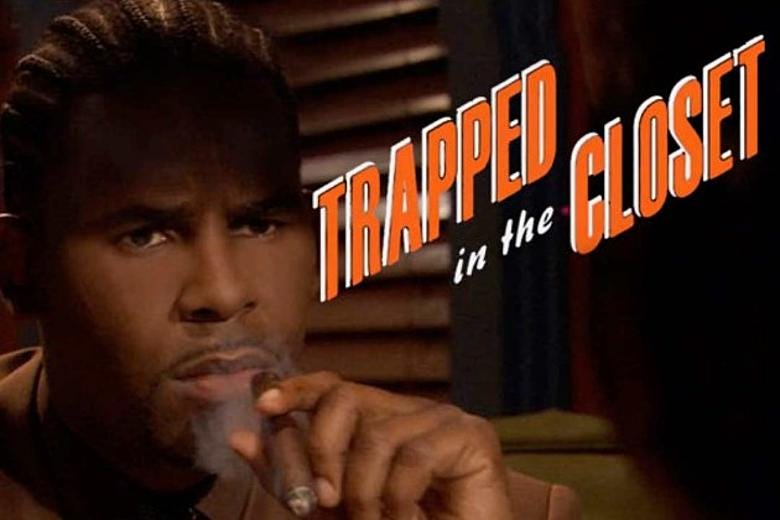
So, because the content of this essay will never matter as much as the title and summary, I’ll just give you the conclusion I’ve come to after reading the analysts, heaps of related and semi-related bits of psychological literature, reading as many manifestos as I’ve been able to get my hands on (some many times), talking to multiple witnesses personally, and having close ties to two mass shootings—in one case, knowing surviving victims, and in another case knowing the shooter.
Here’s the rub: it’s fundamentally about feeling trapped without hope of escape.
Even if they’re not in a physical cage, they’re in a mental cage; often placed there (in their estimation) by society. Taxonomies of mass shooters have been made, and there’re at least 4 types. Read those if you want, I tend to think there’s been an evolutionary development based on accumulated awareness of previous iterations, coupled with increased influence of the digital space, so I think taxonomic categories which describe shooters as primarily motivated by some localized revenge (e.g. the Canadian shooter who wanted to get back at “preppies” and “jocks”) is largely obsolete and increasingly rare.
The enemies have become broader and certainly more non-local.
They’re almost always lonely, but they’re not always lonely losers (though they often are, by their own admission).
As stated, I believe they are people who cultivate an alter ego—an immaterial alter ego that’s free, unlike their base, material self. Eventually that alter ego seeks to incarnate in the material world. We all do this. Everyone who has an online persona is doing the same thing. To what extent it relates to your real persona, I don’t know. But for many people who consider themselves influencers, there is a harsh separation, a dividing line, and a dissonance between their online persona, which is curated in the current immaterial realm—the digital realm—and the material realm.
And eventually, those lines blur, and it’s tough to tell where the performance ends and where the person begins. They craft a persona which they pour more and more life and energy into until the pressure builds so much that this thing is seeping into them, demanding expression.
Again, plenty of people do this—but when their harmless immaterial alter egos incarnate in their material life, it usually manifests is by them saying the word “bruh” a lot. It’s irritating and cringey, but it’s not dangerous.
These shooters have cultivated a violent, harsh persona. And its reification demands violence. The reason this is so prevalent these days, I would speculate, is because we have more areas for people to cultivate these things.
One shooter described being part of the “school-shooter subculture” on Tumblr when that cesspool was popular. There’s an aesthetic to it.
There is even a tradition to it. You see people writing about previous shooters, talking about their mistakes and their legacy. Sometimes, as with the Virginia Tech shooter, talking as though they were a gallery of saints or heroes in a line of succession that he hoped to join.
Many of them seem to describe something that might be likened to firing the first shot in a revolutionary war that would eventually overthrow—something, maybe society or the world itself, depending on how strong of religious language they’re adopting (many talk in apocalyptic terms, including “doomsday” and such). Whatever it is that’s to be overthrown in this revolution is viewed as being doomed already, so there’s an accelerationist tendency here.
Couple this with it being a prestige form of suicide and a great spectacle and we might find the internal narrative to be something like, “this place is doomed to either fall or fester, so I’m going to get out now, and cement myself in history in the process.”
Note: I don’t think it would be prudent to overstate this tendency, as not all manifestos articulate the same levels of grandeur, as has been noted in shooter taxonomies.
Either way, what I find to be most common is this feeling that there is simply no other way. Or, at least, no better way; thus they take on this mission (Minneapolis shooter’s words, but others call it a crusade, conquest, whatever), even if they consider it a burden.
And here’s the most controversial part that betrays my biases. There’s something deeply human in some of these (though not all) manifestos. In fact, this, to me, seems to be a recent development (i.e. last 5 years or so). See, they understand the spectacle of the whole thing, because they understand that it is going to be viewed and studied (or they erroneously assume it’ll studied) under a microscope.
They will take all manner of measures, very often detailed in their manifestos, to be as clear and precise as possible—not realizing that it’ll mostly be ignored.
Sympathy for the Devil
So, what’s this human thing that’s so contentious? Well, it’s subtle. Something seemingly aimed directly at the friends and family, but also serving to speak to the audience about friends and family, and I’m not convinced anyone who isn’t in the inner circle of a shooter would ever pick up on it, but it’s something like:
“You didn’t fail. I know you couldn’t have expected this. I know you would never have wanted this.”
This is a sincere apology to the loved ones that’s simultaneously said with an awareness of an audience. Immediately, when I read this in my friend’s manifesto, I thought (and so did everyone else) that this was him protecting us and his family from what could have been legal or social trouble.
Immaterial Alter Egos
We live in a world where we are perpetually crafting these immaterial alter egos, crafting mythologies about others, reacting to those mythologies, and so on. This is our social sphere. We really want it to be more about this person being a bigot or that person being trans than what it really is: the bigotry and trans stuff were symptoms of a social issue that they knew not how to express.
Look at the Minneapolis shooter. It’s a transgender person who didn’t want to be transgender anymore—refused to cut the long hair because it would be an admittance of defeat, so embarrassing that they couldn’t bear it.
As I’ve said elsewhere, we’ve regressed into an honor–shame culture, one so powerful that it causes people to decide it would be more honorable to die committing an atrocity than to live in shame. They want to reclaim their story from “loser who couldn’t bear to be trans anymore” to “villain,” because at least then it’s their choice how they’re classified. It’s a desperate bid for agency in a world that’s made them feel as though they’ve lost it.
Most shooters aren’t trans, but I get the sense that this theme is the key.
They’re trapped, existentially. They either don’t have a metaphysics to fall back on to make sense of the problems of the world, or they’ve crafted a unique cosmology all their own. One friend of a friend wasn’t a mass shooter, but did a heinously violent act and his online ramblings made all of us think, “dude, this sounds the same.” The themes that stuck out to us were a rigid dualism (good vs. evil), a liberation fantasy (I need to get out of this world), and a dehumanization of others (in this case, they were called aliens or parasites, but I’ve seen shooters call them sheep or insects as well).
Playground Rules
Chael Sonnen’s said it many times, and it’s never proven not to be true: playground rules apply everywhere in life. If you don’t give people a way out of a fight when they want out, you’re the bad guy. They’re likely to do something drastic and unpredictable. These shooters are in just such a situation, but without the catharsis of a physical beating where they can deal a reciprocal blow.
Here’s some good playground advice: if you ever, ever, in your life, find yourself in a situation where somebody does something wrong or something embarrassing, or something that upsets you, or they put their foot in their mouth and they’re looking for a way out—give them a way out, because they’ve already lost. If you’re so desperate for power that you enjoy watching others wriggle, seek help.
But you say, “what, what the heck did I do?” Very little! You’re just one spider that’s spinning some limited webs, and you’re tangled up in both your own and others, even as you continue to spin. What, do you think shooters don’t have access to the same existential crises the rest of us chew up and poop into one another’s mouths everyday?
Imagine if you really believed that tyrants and pedophiles and gang members and political enemies and even mother nature itself all sought to eliminate you, if you had to regularly face national or international-scale problems you know you’re powerless toward, while simultaneously dealing in personal problems like money and responsibility, while simultaneously lacking the resilience to deal with these things because you spend 20%+ of your life in a digital space that’s driven primarily by extreme negative emotions and porn. Wouldn’t that stress you out?
“Yes, but I don’t go shooting people when I’m stressed!” Me either, good for you. But that’s interesting—if there really is all these hopeless, larger-than-life problems in the world, why haven’t you been more violent? I mean, there’re only so many options, as far as I can tell:
You don’t believe it enough to take it as a call-to-action.
You don’t think action is necessary.
You think action is necessary, but it shouldn’t be violent.
You’ve already moved on to reacting to the next crisis long before you could be stirred to action.
If you’re a pacifist, more power to you. But for most of us, it’s number 4.
My contention is that the development of the mass shooter’s psyche is so intertwined with society, which is so digitized, that the key focus needs to be on digital culture.
Note: I think digital culture, for all of us, especially shooters, takes on a quasi-religious or explicitly religious framing. But, again, I think such an essay would be pointless to write. So is this one, actually, but at least it’s easier to ground.
The Aurora Theater
I think a major shooting that serves as a good midpoint between Columbine and now, both chronologically and developmentally is the theater shooting. James Holmes explicitly called on imagery from the Batman movie, he wanted to do it at the Denver International Airport, but he decided it would be more fitting to do it in a place where people were enjoying themselves, so he shot up the movie theater at The Dark Knight Rises premiere.
He dressed as the Joker, and he wrote in his notebook that “the message is that there is no message.” He was trying to create a singularity of meaning—something that you can’t interpret.
Well, unbeknownst to him, we were able to interpret it just fine. He’s crazy, and he should be in prison forever. He’s evil. He did this because he’s an incel, loser, pathetic moron. Sorry, Holmie, there’s nothing you can do to stop our incessant subsummation of your message into our broader mythos.
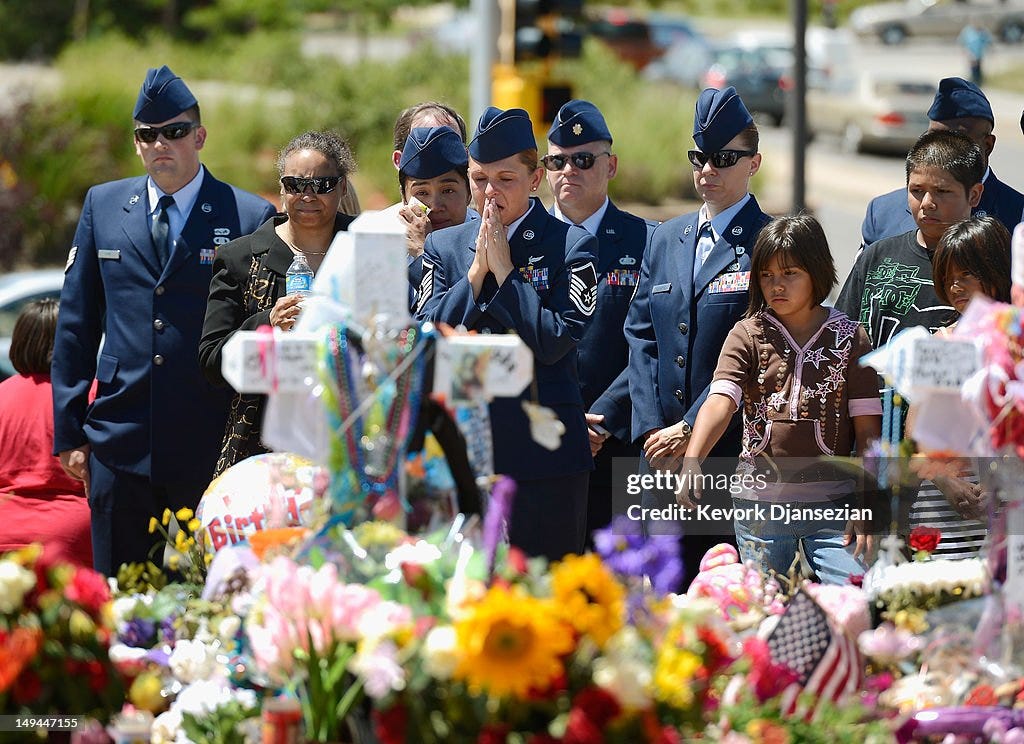
Now, that was in 2012, and we have progressed a lot further since.
These days, you’ll still get all the personal insults, but they’re mostly ornamentation on our two real goals: political narratives and fantasizing about what punishments you deserve.
And it doesn’t matter how apolitical you hope to be. You can’t escape it. No matter what, you will not be given a voice, no matter what you do to try to seize it. You will only be given a voice if you seize that voice by playing the rules of the digital sphere, which are algorithmic in nature.
You can’t seize it by violence. You can’t seize it by pleading. You can’t seize it by reasoned argument, and you can’t seize it by careful presentation or deft writing. The shooters are aware of these things, and try to mitigate it (nuanced, hedging, qualifying language, explicit clarifications, and so on), but ultimately they’re fighting a foe that’s abstract and complex enough to actually resemble the existential threat they think they’re fighting.
The Mangione Effect
Luigi Mangione is a great example here, though he wasn’t a mass shooter, he demonstrates the sort of thinking the shooters engage in. Specifically, why didn’t he go to a specific office that denied specific claims and shoot the people there? Because he knew that there’s a distribution of responsibility within a corporation just as much as he knows that an individual corporation has distribution of authority within an industry. The claims would still get denied if he killed some low-level workers, because the decision-making authority isn’t easy to pin down.
Thus, a direct blow was impossible… by the time you killed enough people to stop such decisions, you’d have killed the same people who could decide in your favor. No, the Mangione Effect as I like to call it, requires symbolic killing to strike the hearts and minds of those he hoped to influence, to become a threat beyond himself—”yes, it’s me now, but who will it be next? Keep it up, and you might fall victim to another disgruntled person.”
Who did he hope to influence? “Healthcare”—the whole, darn system. The system will hardly notice if you shoot up one small office, but execute a CEO? They’ll have to notice!
I mean, not really really; he changed nothing and was an abject failure whose good looks will almost certainly not do him any favors in prison—but it’s nice to pretend sometimes.
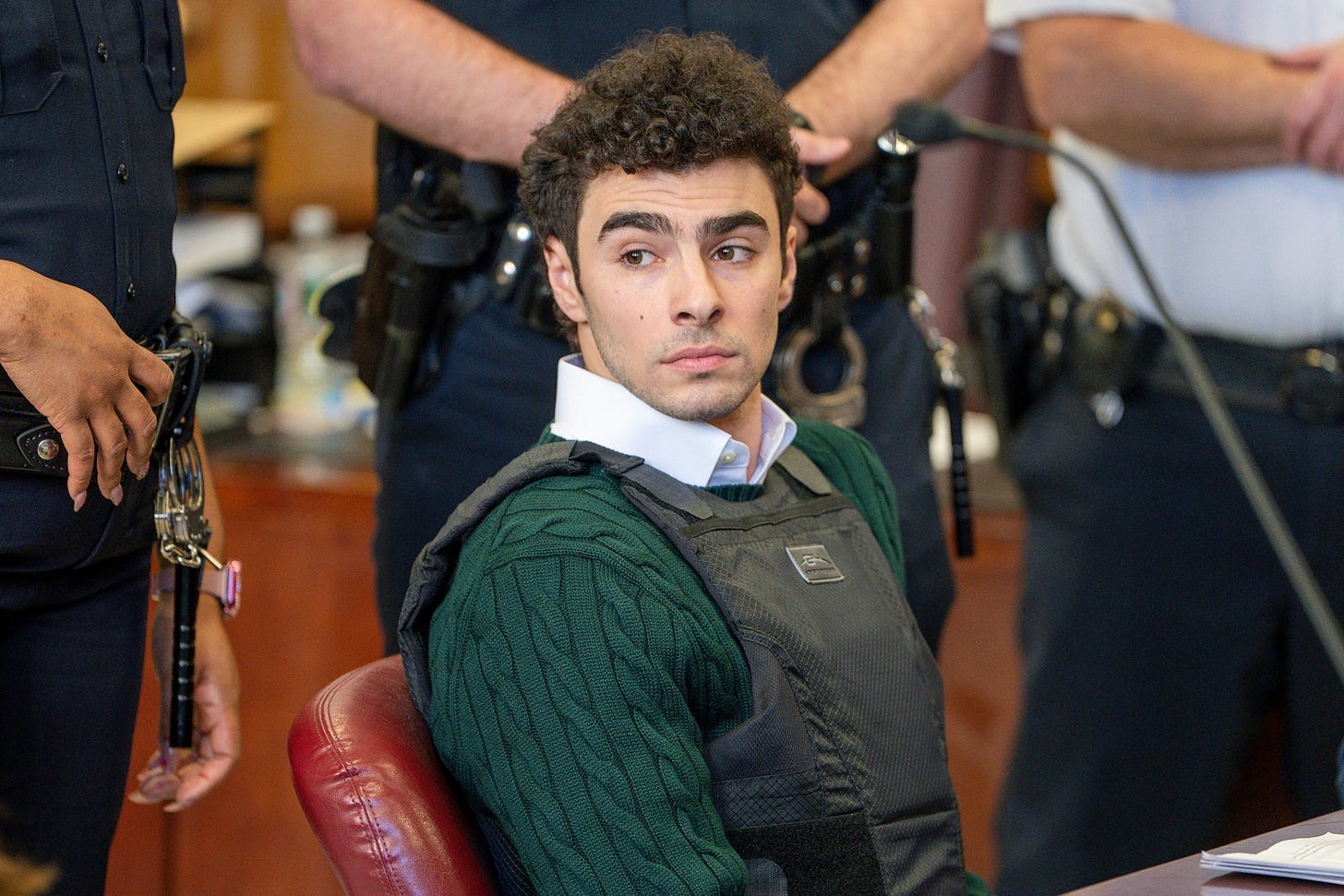
He thought that he could start a revolution, just like the mass shooters, by dealing a black eye to the quasi-divine entity… but there’s no revolution to be had.
This is the key thing that separates us from them. We know it’s all for pretend, they don’t. We experience the Mangione Effect and everyone hops online to say things like “We’re waking up now! They feared this! They separate us by politics, but it’s really us vs. the elites!” But that’s just stuff you say; it’s internet talk. It’s not stuff you do unless the do can be done while you’re going doo-doo, because tweeting about it is just about the extent of actions we’re willing to take.
Super Final Conclusion
These mass shootings are in the same category. We care about children, hopefully, and we should pray for them and grieve for them, and it should really burden us internally.
But, and again this is going to come off as a bit contentious, but someone’s gotta say it: we care less about the kids that are dead and the kids that are injured than we do about stating that “there’s a special place in hell for the person who did this to those kids!”
I know, I know, “it’s both!” It’s not. I have access to the same internet you do, I was part of the same Aurora that was brandishing all those “Aurora Rises” stickers after the shooting (great gimmick, the seller probably made a bundle), and I got to see all too well how the lot of us react to shooters.
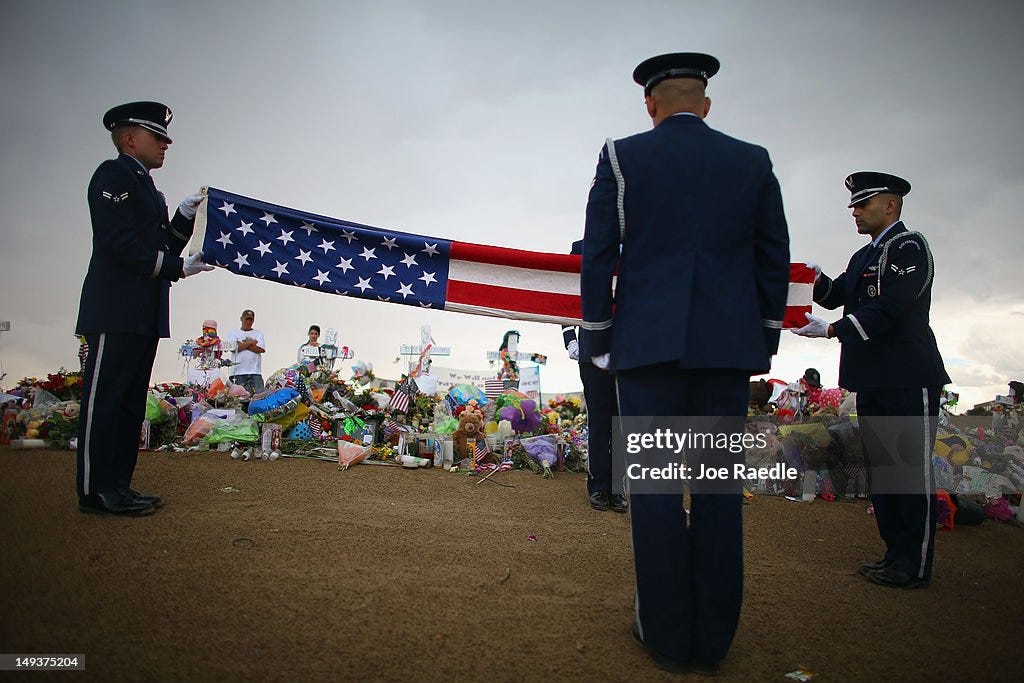
I think that if we could describe how much we hate the shooter 100 times in 100 different ways with more and more ire each time, it would be more satisfactory to us than resurrecting their victims.
For know, dear ones, that every one of us is undoubtedly responsible for all men- and everything on earth, not merely through the general sinfulness of creation, but each one personally for all mankind and every individual man. This knowledge is the crown of life for the monk and for every man. For monks are not a special sort of men, but only what all men ought to be. Only through that knowledge, our heart grows soft with infinite, universal, inexhaustible love. Then every one of you will have the power to win over the whole world by love and to wash away the sins of the world with your tears.
—Father Zossima


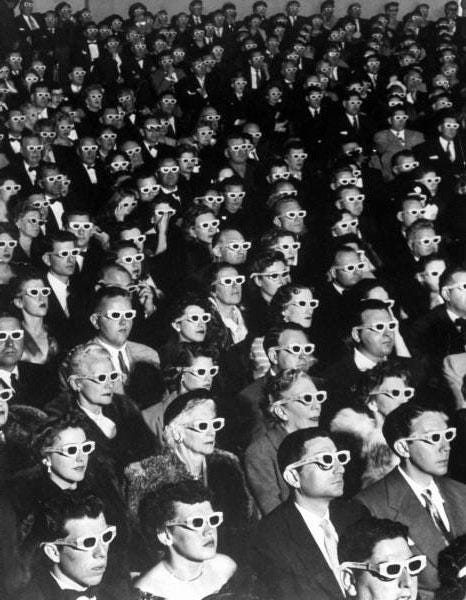
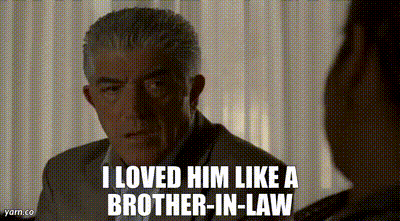
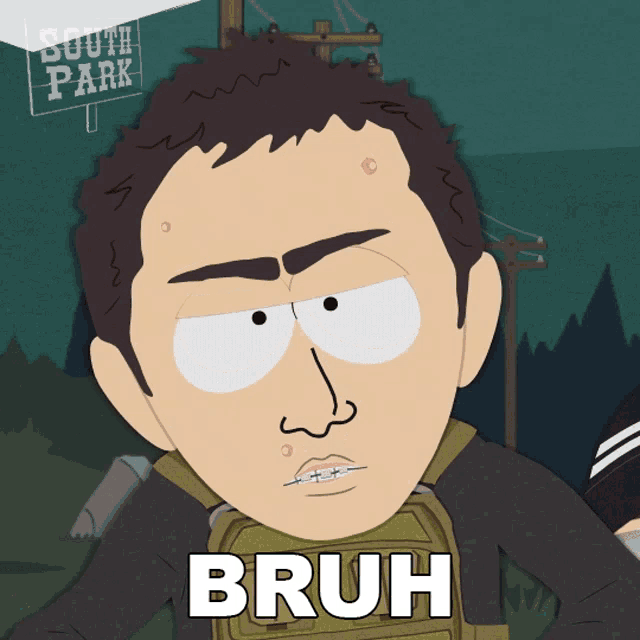
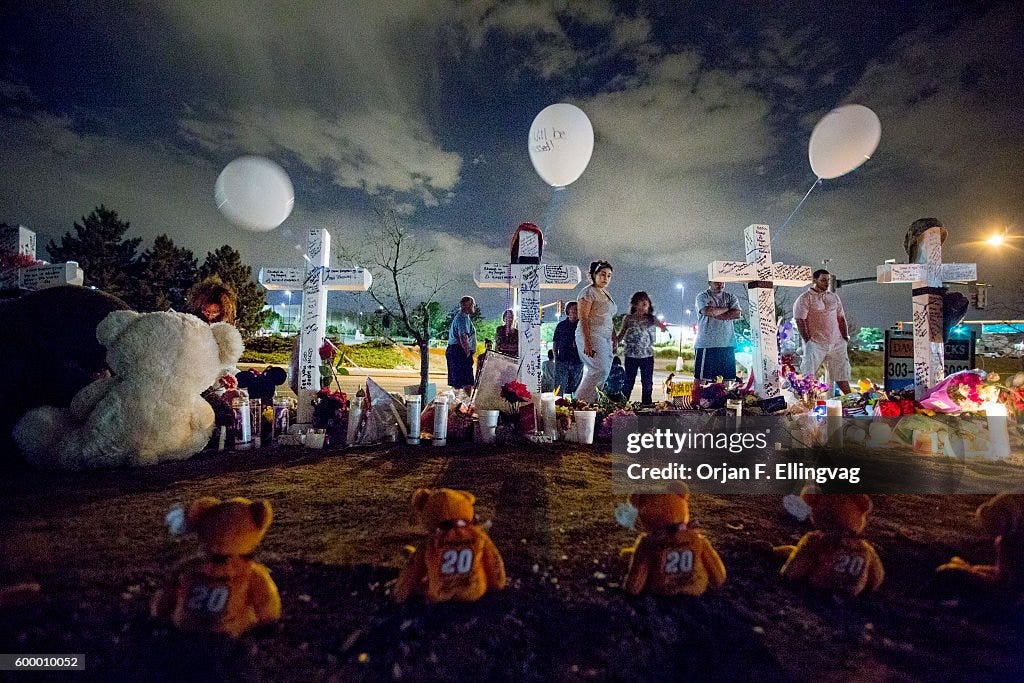
You're absolutely right: "A holistic reading of the entire thing would have indicated to everybody involved this was a spiritual crisis, because that was the entire through-line, and it doesn't take a semester of college literature to read that." This IS a spiritual crisis, and it requires biblical discernment to recognize it.
The spiritual crisis is on a national level. We've systematically removed yirah (Hebrew: reverent fear of the Lord) from schools, public discourse, and homes, replacing it with what Scripture calls ra'ah (comprehensive evil/corruption). The result isn't surprising. A culture that idolizes death-obsessed ideologies while rejecting divine grace produces exactly these violent eruptions against the innocent.
Your observation that "we're conditioned to read. We read in snippets, we read in highlights, and we read in summaries and focus on superficial traits of the form" reveals something deeper than convenience. We've been conditioned for qatzar ruach (shortness of spirit): fast results, easy answers, trusting speakers over sources. This systematic formation moves us away from biblical biyn (understanding through meditation) toward algorithmic consumption.
The news agencies you mention? Classic agenda manipulation. "News agencies who'd reported the story before I had heard about it claimed that they only had parts of it, or would only reveal parts of it so as not to platform the individual as they desired. Convenient! They platformed their message and saw fit to platform the snippets that aligned" with their predetermined narratives while suppressing broader context.
You nailed the spiritual battle when you wrote: "Here's the rub: it's fundamentally about feeling trapped without hope of escape." When we systematically rob people of tikvah (hope anchored in divine purpose), despair becomes combustible. Remove transcendent meaning from societies that reject Yahweh and eternal yeshuah (salvation), and material existence feels like a trap demanding violent escape.
Your insight is profound: "I believe they are people who cultivate an alter ego—an immaterial alter ego that's free, unlike their base, material self. Eventually that alter ego seeks to incarnate in the material world. We all do this. Everyone who has an online persona is doing the same thing." This is exactly right. Everyone curating digital identities practices a form of gnosticism, believing their "true self" exists in the digital realm while their physical reality remains fallen. When that digital self demands material expression, violence becomes the bridge.
This connects directly to what you identified: "Whatever it is that's to be overthrown in this revolution is viewed as being doomed already, so there's an accelerationist tendency here." I've been tracking these accelerationist ideologies across multiple domains. Whether trans-humanist, political, or religious, they share this pattern: reality must be violently overthrown to incarnate their digital mythology.
Your observation that "We live in a world where we are perpetually crafting these immaterial alter egos, crafting mythologies about others, reacting to those mythologies, and so on. This is our social sphere" captures the essence of what happens when surveillance capitalism feeds on spiritual vulnerability for profit. We must examine the intentions of those controlling our media and social platforms. What benefit besides wealth accumulation outweighs authentic interpersonal connections and physical community?
What we're witnessing fits the WISE Framework perfectly. Digital platforms have become altars for false transcendence. Virtual personas replace authentic image-bearing relationships. Individual mythology replaces community flourishing. Temporal revolution replaces eternal redemption.
Your call to "Give them a way out, because they've already lost. If you're so desperate for power that you enjoy watching others wriggle, seek help" demonstrates exactly the pastoral heart needed. Rather than enjoying others' desperation, Scripture provides response frameworks. The REFUGE Framework becomes essential: recognizing that sacred communication requires protection from surveillance capitalism.
You're right that "digital culture, for all of us, especially shooters, takes on a quasi-religious or explicitly religious framing." This might be something worth addressing further. I have the frameworks and Scripture for it. Digital culture offers false transcendence, but our response isn't withdrawal. It's digital discipleship: showing how biblical wisdom addresses the spiritual hunger that algorithms exploit but cannot satisfy.
Your observation that "ultimately they're fighting a foe that's abstract and complex enough to actually resemble the existential threat they think they're fighting" reveals the troubling parallels between constructed reality and genuine spiritual warfare. We must intentionally create digital cities of refuge where authentic Christian community can form without corporate exploitation of our spiritual conversations.
The essay may feel "pointless," but your analysis demonstrates exactly what's needed. Christians who can diagnose spiritual warfare while providing hope-anchored solutions through biblical frameworks. This requires what Nehemiah demonstrated: simultaneous wall-building and community encouragement. That's the kind of cultural engagement Scripture calls us to.
"It was spiritual, but it didn’t matter because he had done something evil, and when someone does something evil, you can attribute any other evil to them you like."
A classic insight and well put, this was a fine piece on the nature of things, as you wrote it's much more important to condemn the action and act out a bit of theater than anything.
In your words, "we care less about the kids that are dead and the kids that are injured than we do about stating that" “there’s a special place in hell for the person who did this to those kids!”
The punitive desire is much stronger than the drive for rehabilitation, see the majority of prisons for examples.